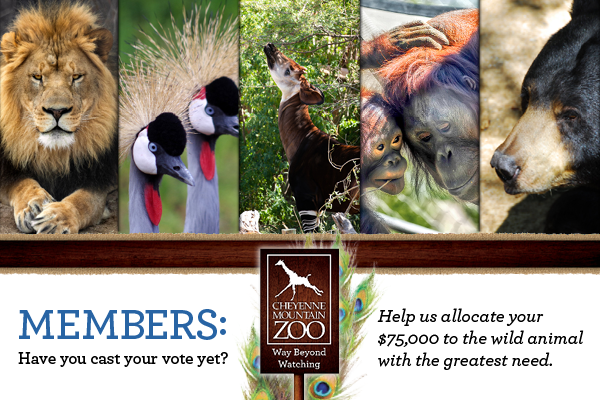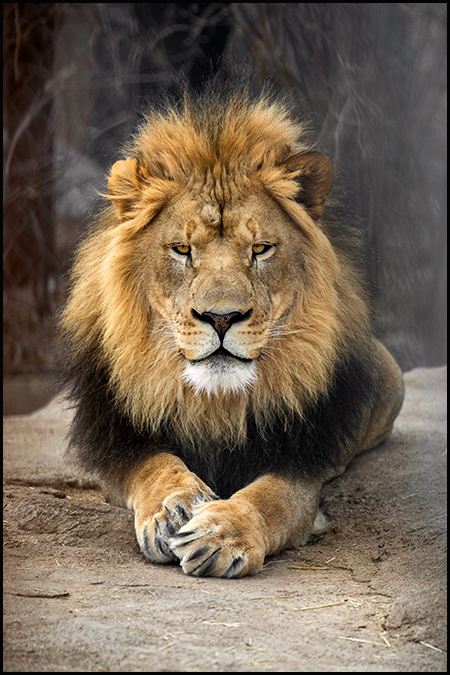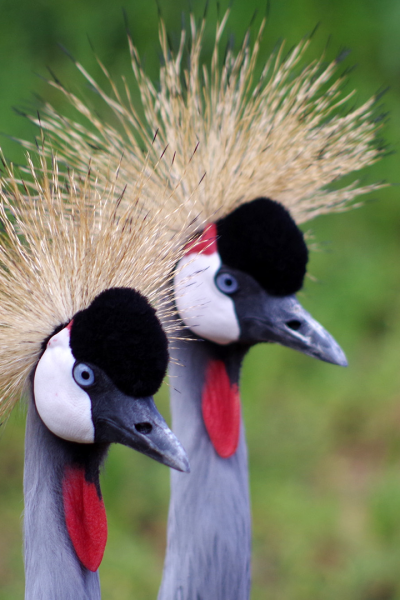Every membership and every visit to the Zoo is conservation in action. Since 2015, including this year’s contributions, the Member Conservation Vote has provided $525,000 of membership revenue to support field conservation worldwide. Each year, a total of $100,000 of membership revenue is contributed to conservation in two ways:

- $25,000 to the Quarters for Conservation program, which in total contributes half a million dollars on average annually to CMZoo’s legacy conservation partners.
- $75,000 to projects voted for by CMZoo members through this annual vote.
“Over the years, members have funded projects that support organizations working to protect vulnerable species in places like Ecuador, Kenya, South Africa, Southeast Asia, Australia right in our backyard,” said Dr. Liza Dadone, vice president of mission and programs at CMZoo. “These grants make a huge impact for the small-but-mighty projects that are making a difference for wildlife, wild places, and the people who border their habitats. We wouldn’t be able to support them without our members.”
Through Sunday, March 28, 2021, members will cast their votes to help the Zoo decide how to spend $75,000 of member conservation funds among five conservation projects vying for support. The three projects with the most votes will receive the full funding they requested. The number of votes received for the remaining three projects will help CMZoo decide how to distribute the remaining funds.
The five conservation projects up for our members’ consideration are:
Protect LIONS, CHEETAHS and WILD DOGS from diseases
Through a long-time partnership with Ewaso Lions, this organization aims to protect lions and other large carnivores by vaccinating pet dogs in northern Kenya. This funding will support a pet vaccination program by providing local communities with trained personnel, vehicles, veterinary equipment, and materials to make collars that will identify vaccinated dogs. These vaccines can prevent life-threatening diseases like rabies and distemper from being spread from pet dogs to wild carnivores.
Continue the banding, monitoring, and protection of CROWNED CRANES
This grant will fund the banding of 100 East African crowned crane chicks and support data collection to guide future conservation efforts for this species. This project will also establish a Crane Custodian Program, training local community members to advocate for and assist with crane data collection – a crucial component of crane conservation, especially during COVID-related travel restrictions. Found in Kenya, the East African crowned crane has seen a dramatic decrease in population over the last four years. In a continued partnership, the International Crane Foundation and the Leiden Conservation Foundation are collaborating to learn more about this species in order to stabilize its population.
Support more agroforestry to protect OKAPI habitat
In a continued partnership with the Okapi Conservation Project (OCP), this grant will provide farmers with tools, seeds, natural fertilizers and education in sustainable agriculture practices. Funds will also support reforestation in the region. Found in the Democratic Republic of Congo, okapi are threatened by slash-and-burn agriculture and poaching. This program empowers local communities to produce food sustainably, safeguard water resources, and generate income, while reducing their economic dependence on mining and poaching, thus protecting okapi in the long run. Over the last year, OCP has distributed over 65,000 kg of seedlings and over 62,000 kg of food seeds to more than 900 farmers in the region. Even more exciting, they have been visited by a wild okapi, which is extremely rare.
Reforest a wildlife corridor and help save ORANGUTANS in Borneo
In support of two established organizations working to save species in Southeast Asia, this grant will help the HUTAN organization provide tools and funds to local women reforesting the Genting Wildlife Corridor. It will also help the Borneo Orangutan Survival Foundation (BOSF) repair orangutan rehabilitation islands damaged by a devastating flood. The HUTAN corridor is an important animal “wildway” that will connect virgin rainforest with a wildlife sanctuary and is needed by hundreds of species in the area, like orangutans and Asian forest elephants. The BOSF grant provides emergency funds to reopen islands used for orangutan housing and forest school prior to release.
Track AMERICAN BLACK BEAR movements in Colorado
In a new partnership with Colorado Parks and Wildlife, this grant would fund placing GPS collars on black bear juveniles to collect information about their movements and habitat use after rehabilitation and reintroduction. This valuable data will support ongoing efforts to reduce human-bear wildlife conflicts in the Pikes Peak Region. One of the main drivers of human-bear conflicts is unsecured trash, which serves as a strong attractant for bears. Unfortunately, female bears with cubs can be drawn to unsecured trash and human-wildlife conflicts can then lead to orphaned bear juveniles. Colorado Parks and Wildlife rescues and rehabilitates these young bears, and releases them once they are old enough to live successfully in the wild. As human developments sprawl into historical bear habitat, this data could guide solutions to keep bears safe and behaving like wild bears.

“Our members are passionate about conservation and have formed connections over the years with familiar projects, like the Okapi Conservation Project’s agroforestry program, and Ewaso Lions’ ongoing lion conservation,” said Emma Repp-Maxwell, CMZoo membership manager. “It’s also inspiring to get behind fledgling projects, like the banding of crowned cranes, which we launched last year and will continue to support in some capacity this year. Two brand-new projects – black bear tracking in Colorado and supporting a wildlife corridor in Borneo – are new projects to consider this year. It’s up to our members to help us decide which projects receive full funding.”
We’ll announce the 2021 rankings next month, so stay tuned.
Last year, members voted to fund projects from the Australia bush fires to continued conservation efforts in Kenya and the Democratic Republic of Congo. To learn about the progress made because of the 2020 Member Conservation Vote, read on.
Zoos Victoria: Emergency Funding ($20,000)
Before launching the member vote last year, we asked members to approve emergency funding in response to the devastating Australia bush fires. Members’ early votes helped support the long-term care of animals impacted by this disaster.
Learn more: https://www.cmzoo.org/news/archive/cheyenne-mountain-zoo-members-donate-20000-to-australia-bushfire-recovery/
African Lions: Fully Funded ($5,600)
Member votes supported the planning for wildlife corridors in northern Kenya. As more highways, railways, cities and pipelines are built in the heart of lion country, this project supported the partnerships and infrastructure needed to keep wildlife safe.
Crowned Cranes: Fully Funded ($11,000)
Member votes helped launched the first efforts to band and monitor wild crowned crane chicks in East Africa. Despite COVID-19, around 20 crane chicks were banded. With such limited information on the behaviors of cranes, this project will help gather important information for future conservation efforts.
Learn more: https://www.cmzoo.org/news/archive/cmzoo-member-supported-east-african-crowned-crane-conservation-project-makes-progress/
Mountain Tapir: Partially Funded ($20,000)
Member votes supported the continued GPS collaring and monitoring of 5 additional tapirs in Ecuador. This project has already seen the radio collaring and successful monitoring of 10 wild mountain tapirs. The information collected helps conservation efforts.
Learn more: https://www.cmzoo.org/news/archive/cmzoo-tapir-expedition-team-returns-from-ecuador/
Okapi: Fully Funded ($11,000)
Member votes helped the Okapi Conservation Project continue an already successful agroforestry project, aimed at encouraging sustainable farming practices, habitat protection and reforestation. By teaching local communities better practices, they are able to protect their livelihoods and wild okapi nearby.
Learn more: https://www.cmzoo.org/news/archive/work-to-protect-wild-okapi-continues-thanks-to-cmzoo-members/
For more information about how to become a CMZoo member, and the many benefits that memberships provides, visit cmzoo.org/membership.

